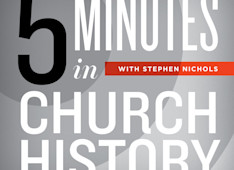Why Church History?

The bombing of Britain during World War II leveled most of the area known as “Elephant & Castle” in the city of London. A row of pillars stood defiantly among the piles of rubble. These pillars belonged to the Metropolitan Tabernacle, the church that housed the larger-than-life preacher of the nineteenth century, Charles Haddon Spurgeon. Those pillars well represent Spurgeon. He was solid. He stood tall in his own day, and like the pillars, his legacy still stands.
Spurgeon has friends across many pews. Baptists like Spurgeon because he was a Baptist. Presbyterians like Spurgeon because he was so Reformed. Even Lutherans like Spurgeon because he was very nearly a nineteenth-century version of Martin Luther.
While Spurgeon held forth at the Metropolitan Tabernacle, Londoners would flock to hear him preach. In fact, people even traveled the Atlantic to hear him preach. He wrote many sermons, of course, while he was at the Metropolitan Tabernacle. And Spurgeon also wrote many books.
In one of his many books, Spurgeon made a comment well worth hearing. It comes from the preface to his book on commentaries. He had written this book to convince pastors of the need to use commentaries and to engage in deep study for their sermon preparation. Spurgeon well knew the value of reading for preaching. He had a personal library of around twenty-five thousand books. And this was in the 1800s. What’s more, he actually read most of them.
In the preface to this book, he speaks to an objection to using commentaries. The objection goes something like this: As a Christian, I have the Holy Spirit. I have the Spirit’s wonderful work of illumination. I don’t need commentaries; I don’t need to rely on the thoughts of others. I can go right to the source.
To that objection, Spurgeon replied, “It seems odd, that certain men who talk so much of what the Holy Spirit reveals to themselves, should think so little of what he has revealed to others.”
Spurgeon reminds us that the Holy Spirit is not an individual gift. The Holy Spirit is a corporate gift to the body of Christ. The Holy Spirit has taught others, and the Spirit uses others to teach us. Spurgeon’s argument reaches the conclusion that preachers should use commentaries. Don’t be arrogant, and don’t think you have a corner on the market of the Holy Spirit, because you don’t.
But what if we were to expand Spurgeon’s argument in order to apply it to the relationship of today’s church to church history? Here’s my paraphrase of Spurgeon’s argument: “I find it odd that the church of the 21st century thinks so highly of what the Holy Spirit has taught it today that it thinks so little of what the Holy Spirit taught the church in the first century, the second, the third, the fourth, and so on, and so on.”
The Holy Spirit is not unique to our age. The Holy Spirit has been at work in the church for the past twenty centuries. We could put the matter this way—it is rather prideful to think that we have nothing to learn from the past. And remember, pride is a sin. And also remember, as Scripture says, “Pride goes before destruction, and a haughty spirit before a fall” (Prov. 16:18). We need a little humility. Enough humility to say we may not have all the answers in the present. Enough humility to say we need the past, and enough humility to visit it from time to time.
As Deuteronomy 6:10–11 vividly portrays for us, we drink at wells we did not dig, we eat from vineyards we did not plant, and we live in cities we did not build. We need that dose of humility that reminds us how dependent we are on the past and how thankful we need to be for those who have gone before us and dug the wells, planted the vineyards, and built the cities.
The past enriches our lives in surprising ways. In our past, our family history, we see examples of faithful disciples. We can be encouraged and even inspired by their faithfulness. But, far more, we see examples of God’s faithfulness to His people. How does Paul put it in 2 Corinthians 1:10? He declares: “He delivered us from such a deadly peril, and he will deliver us. On him we have set our hope that he will deliver us again.”
The centuries of church history give us a litany of God’s deliverances. God has done it before, many times and in many ways, and He can do it again. He will do it again. And in that, we find courage for today and for tomorrow.
In church history, we see men and women facing challenges not unlike the challenges before us today. We look back and we learn. We also learn from the mistakes and missteps of the past. And, though it is a cliché, learning can be fun. Family stories of the exploits of crazy uncles inform; they also entertain. It is the same with our history, our family story.
More from this teacher
Stephen Nichols
Dr. Stephen J. Nichols is president of Reformation Bible College, chief academic officer for Ligonier Ministries, and a Ligonier Ministries teaching fellow. He is host of the podcasts 5 Minutes in Church History and Open Book. He has written more than twenty books, including Peace, A Time for Confidence, and R.C. Sproul: A Life and volumes in the Guided Tour series on Jonathan Edwards, Martin Luther, and J. Gresham Machen. He is coeditor of The Legacy of Luther and general editor of the Church History Study Bible.
General Church History
Resources about men and women who were faithful servants of the Lord, including: biographies, missionaries, and theologians.










